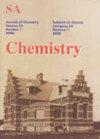在科学俱乐部做厨房化学时对科学的态度
IF 1
4区 化学
Q4 CHEMISTRY, MULTIDISCIPLINARY
South African Journal of Chemistry-Suid-Afrikaanse Tydskrif Vir Chemie
Pub Date : 2023-01-01
DOI:10.17159/0379-4350/2023/v77a10
引用次数: 0
摘要
南非九年级自然科学课程建议使用日常科学向学习者介绍科学的有用性和相关性。然而,许多学习者似乎对科学学习和科学作为一个实体持消极态度。本研究是一项干预,旨在确定南非资源不足学校的8年级和9年级学生在资源不足的乡镇学校的科学俱乐部开展厨房化学实践活动后的态度。学生们接受了关于他们经历的采访,科学俱乐部的大学生志愿者也接受了采访。采用归纳演绎主题法对定性访谈数据进行分析。研究发现,学生在参与厨房化学实践活动后,对科学的态度更加积极。此外,日常知识的整合促进了概念理解,提高了学习者的表现。对学生志愿者的采访揭示了他们认为可以改善学习者对科学态度的方面。由大学生志愿者组织的科学俱乐部有助于促进学习者对科学的积极态度。本文章由计算机程序翻译,如有差异,请以英文原文为准。
Attitudes to science when doing kitchen chemistry at science clubs
The South African grade 9 Natural Sciences curriculum suggests the use of everyday science to introduce the usefulness and the relatability of science to learners. Many learners, however, seem to have a negative attitude towards science learning and science as an entity. This study is an intervention that sought to ascertain the attitudes of grade 8 and 9 learners in under-resourced schools in South Africa after they had carried out kitchen chemistry hands-on practical activities at science clubs in under-resourced township schools. The learners were interviewed about their experiences, and university student volunteers at the science clubs were also interviewed. An inductive-deductive thematic approach was used to analyse the qualitative interview data. The findings of the study revealed that the learners had a more positive attitude toward science after they had been engaged in the kitchen chemistry hands-on practical activities. Additionally, the integration of everyday knowledge promoted conceptual understanding and improved the performance of the learners. The interviews with the student volunteers revealed aspects that they thought would improve learners' attitudes to science. Science clubs run by university student volunteers could assist in promoting a positive attitude to science among learners.
求助全文
通过发布文献求助,成功后即可免费获取论文全文。
去求助
来源期刊
CiteScore
3.10
自引率
0.00%
发文量
6
审稿时长
>12 weeks
期刊介绍:
Original work in all branches of chemistry is published in the South African Journal of Chemistry. Contributions in English may take the form of papers, short communications, or critical reviews.

 求助内容:
求助内容: 应助结果提醒方式:
应助结果提醒方式:


